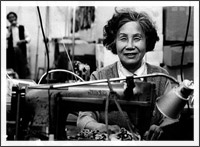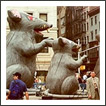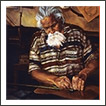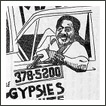Honorable Mention, Narrative
Gwan Sing Au Economics, Sociology and Mathematics, Lehman College
The City, My Youth, and Her Trick

I live in a City, THE CITY.
You probably would want to ask, which city?
Then I would smile, as I would know that you haven't been there before. Everyone knows it, everyone knows which city I refer to if they have been there once. Your curiosity shows me that you are a clueless foreigner.
Oh, I say, imagine it. Imagine that I am here to take you around, and let me introduce you the wonder of THE CITY.
When you open your eyes, the first thing you see is the city wall. It is so shining and clean that you can see your face like it is a mirror. It also is so enormous large that it is full of your eyes. You look up and you can't see its top; you look left and right, and you can't see its end either. You will soon discover that people in THE CITY like big. They want everything to be big, top tier, and superior.
Then you will be led to the door, the only way you, or everyone, can be in and out of THE CITY. You will be disappointed as you expected something more dramatic. It is just a small wooden door. 3 meters high, and 1 meter wide. It at most allows one person goes in or out at a time. You will probably ask, is it very inconvenient if people want to go outside? I will shake my head like I have heard something from a silly child. Why would we want to leave THE CITY? It is supposed to have everything we want. At least it is the what I want to tell every outsider.
You walk behind me, and listen to me how I introduce those famous places, the places designed for tourists, around THE CITY. I introduce them in the same way those tourists books would tell you. You show you are interested modestly, as you don't want to offend me. You probably want me to shut up, but somehow I don't want to. I have to talk, or I would start to think otherwise. Thinking too much is bad. Everyone in THE CITY knows it. I would start to think about something not related to the glory of THE CITY, something too personal to tell a stranger, like you, I have just met first time.
Because you haven't been here before, you will not realize that I actively avoid bringing you to the central point of THE CITY. I don't even turn my head to that direction as if something invisible forces me not to. You are led like a sheep, and your facial expression like a sheep too. Suddenly I am angry inside, as the only place I want to go is exactly the central point of THE CITY. Why wouldn't you suggest it? Why wouldn't you suspect that everything good I tell you about THE CITY is not what I would want to tell you, if you were my close friend?
Suddenly, I stop to walk along the street, and look at the direction leading to the central point. I will be silent, and it makes you wonder why. A minute later, you can't stand and ask, "What is the matter?” I will not answer you, but I will not be able to hold myself to be silent anymore.
“Do you have a lover?” I ask.
“Huh?” You are surprised, but soon you realize that I want to go outside the usual conversation between a tour and a tourist. You have a kind heart, and glad to comply.
“Yes, I once had someone I really loved.” You smile.
“Me too. She is…well, I am not sure if she considered me as her lover. You know, I am a Chinese, and we usually keep our feeling at heart.” Sure I understand you know I am a Chinese, or at least an Asian. But I still mention it because I want you to know what it means to my behavior.
“Do you see that building?” I point to the direction, and your head follows.
“It is quite tall.” You reply, and look up in in order to meet its top. It is unsuccessful because it is buried inside the cloud under the blue sky.
“Yes, it is very tall, and it is exactly sitting in the middle of THE CITY.”
“How tall is it?” You ask.
“No one knows. People stop to count it 70 years ago.”
“How come? You mean it is still being built?” You are surprised.
“Yes, at least for a while after that time.” I take out a cigarette from my pocket, and try to figure out how to explain it to an outsider like you. THE CITY has many rules, and we are civilized and organized that we never break them.
>Once in the past, there was a very rich man. He wanted to build a very tall building in honor of… well, something. It doesn't matter what a rich man wants to honor as long as he has the money to honor it; rich men always have something to honor in order to spend their wealth.
He made a contact with a building company, and gave them a lot of cash. Unfortunately, He forgot to tell them how high he wanted it to be before he died. It was an enormous mistake, and the company had to keep building it in order to honor the contact; yes, you can say everyone still has something to honor no matter what. Several decades, the grandson of this rich man went bankrupt, and several decades later, the building company went bankrupt too. Since then no one knows how high it is, and people in THE CITY don't bother to know. This building is useless now, and how would people want to know something which is useless? We are clever, and very conscious about time spending. We are gladly to learn what is useful, however. Let me remind you. (I said so because I don't want you to look down on me as an educated illiterate. You know what I think, so you keep your mouth shut and nod your head quietly. )
I lit up my cigarette, and ask you casually, but deeply.
“Do you think people should run away with his or her love?” I ask.
“I am not sure.” You frown as you are thinking, and answer, "Maybe?”
“But where could you run into? There is no place for you to go.”
“Yes, but there must be somewhere outside the wall, right?” Suddenly you realize I am not asking you a question, but telling you something about myself.
“No, there isn't such place. People who claim he has gone outside THE CITY soon discover that there are larger, taller wall in front of him at the far. He IS still in THE CITY. “My face is serious, "No can escape from THE CITY, NO ONE.”
You do not say anything. After all, it is not your business. You can get away from here whenever you want because you are just a tourist. You want to show your sympathy but you are afraid that what you show is your happiness instead; inside you feel fortunate that you are not one of us.
“But when I was a teenager, I didn't think so. I still thought I had a chance to run away.” I sit down in a long, wooden chair in a park. When you look at my back, you feel like you look at an old man who has bend, humpbacked back.
Did I tell you I once knew a Chinese girl named Wai? I must not have been so, because it is my secret. I don't even want to tell you her surname, so I can selfishly keep everything about her to myself. Yes, it is mine. The memory is mine.
I also will not tell you in Chinese, the word "Wai” means "only", so you don't realize how this name would perfectly fit everything about her.
When I met her, I was not more than 17 year old, and she was definitely not as well. I didn’t even have to ask her age. It is because we all knew that in THE CITY every teenager has to go to work when they are 18. It was said that if we went to work, we would be very busy and would not able to hang around aimlessly like teenagers usually do; it was exactly I and she liked to do.
Wai and I were friends because we had similar backgrounds. Our parents were new immigrants, and before that they were illegal ones. (It is kind of funny to know new is something follows “illegal”. Shouldn’t it be “newer” instead?) They have come to THE CITY for the fortune they were promised they would have, and more importantly, for the fortune their children would have in future.
But it didn’t come. The fortune didn’t come.
I always wonder why people would give up that much and come that far to THE CITY. My parents have worked very hard for survival; we can’t even speak the language, English. But I guess it was a good thing. Wai couldn’t speak it either. So sooner or later, we have become friends because we had no one else to talk to.
Wai had a long black hair like silk. She had beautiful eyes, and liked to use them to look at something I didn’t understand why she looked at. She was very skinny, and was silent most of the time. I didn’t know why she liked to talk to me when the desire moved her. Perhaps it is because I was usually silent too. So she could listen clearly what she had said, in her own voice.
We had no money, so the only places we could go were the places tolerant of people have no money. In THE CITY, those kinds of place virtually did not exist. We liked to go to that tall building, as it was abandoned at the time. It served no function for the people in THE CITY, so it was seen as useless as a building could ever be. Since taking it down required money too, it was probably the only reason it was allowed to live. Yeah, it was allowed to live, just as we were.
We often took the elevator to the roof of the building. We liked to stay there because no one else did. We liked to stay there because we could see the night and the sky and star and moon so clearly when we lay down. We liked to stay there because it was the only building tall enough to look past the city wall. We often dreamed of what was there, what was behind thick fogs which always floating around the top of the city wall.
“Why do we have to grow up?” she asked when we were alone. She often liked to ask difficult questions.
I didn’t know the answer, but I didn’t want her to know I didn’t know. So I tried to come up with one.
“Because we have to work?”
“But why do we have to work?”
“So we have food, clothes, and a place to live?” I suggested.
“That is it?”
“We can have a newer and bigger TV.”
“And?” She asked.
“We can have a tongue surgery.”
“Why would we want a tongue surgery?”
“People say we Chinese speak English in a funny way. So if one day we learn to speak English, we can speak it without any accent.” I explained.
“Oh.” It didn’t look like she was impressed.
“And our parents could retire earlier?”
She didn’t reply, and looked at the sky as if she already was told the answer from above.
After a long silence, she said, “Yesterday, my father said he wanted me to have the best education I could possibly have.”
“You mean go to college?”
She look annoyed, “Don’t be silly, Gwan.”
In THE CITY, when people mention schools, it means schools. But when people mention education, what they usually mean is brain surgery.
It has been long rumored that every traditional education we have received is useless, and the only way we can get a job is have our brain properly ‘redesigned’.
“Do you believe it?” she asked.
“What?”
“The rumor. People say the old education is useless. “She was annoyed again, as if she felt I should have understood every bit of her mind.
“I don’t know. It must be some usages, right? If it is useless, why do teachers insist we should learn it?” At the time, in my heart, it was unthinkable that everything, which includes algebra, trigonometry, the year Columbus came to America, or how many states the U.S has, would be useless for our future. I just didn’t believe the world could be that ridiculous.
“So, maybe, just maybe… we don’t need education to have a job?” She sounded relieved.
“Perhaps. What do you ask so?”
“You know, my family is poor. The only way they could support me to have the best education is… to make some sacrifices.” Again, when we say sacrifice, it does mean sacrifice but not the meaning of sacrifice in general. It means selling our body organs.
People say the rich usually have too much fun in their lives, so sometimes they don’t know how to take care of their bodies. When an organ ceases to work, a rich man has to find a replacement, and he is willing to pay a lot of money for it. I don’t really like the idea, but people everywhere assure it is fair, it is “economics”, “supply and demand”, ‘free market” or something like that.
“My father told me that the factory owner called his name when he was working.” She continued, “My father followed him to his office.”
“Then?”
“He suggested my father should sell his brain.”
“Why?”
“The owner said he would be easier to ‘optimize’ my father’s working output if he had no brain. He went on to explain that devoted worker and brain are two words which never can be mixed.” Her voice was little bit sad, “So it would be best for all of us. I can have the best education, and my father can keep his job.”
“But how can a man live without his brain?” I was worried.
“The owner said it would be no problem. His memory will be held in a small memory drive which would be buried inside his skull.”
“What does your father think?”
“He isn’t sure. But the owner insisted it would only help my father’s ‘productivity’, as a worker who has a brain will only be ‘detrimental’ to the factory.” She asked, “What does detrimental mean?”
“It means bad.” I explained.
“Then why don’t they use the word bad instead?”
“Because bad is a simple word? Adults don’t like to use simple words.”
“Adults are weird.” She said.
Yes, they are weird, I agree. But we can’t stop becoming one of them. At 18, every teenager has to have their brain ‘redesigned’, and have some crucial specific knowledge injected into our brains to help us get a job.
Richer teenagers are different, as they would be treated better. The education, I mean the brain surgery, would be higher rated. It would help them find better jobs, get better salaries, and keep them to be rich. At the end, their children would have the education too, so the cycle will go on and on.
“You are worried about the future?”
“A little bit.”
“Why?”
“People say after the brain surgery, we will ‘grow up’, and we will be ‘mature’.” She stopped a moment, and went on, “we will laugh on the days we are still teenagers. We will make fun of what we try to do now. We will refuse to believe what we believe… at last we will forget the one we now love deeply.”
She turned her eyes my way, “and I don’t want to forget you.”
Before I could say anything, she kissed me. The kiss was so gentle, so light that it looked like a dream. And it was because it seemed like a dream, I didn’t dare to move. I was afraid of waking myself up. I just wanted to hold that moment as long as I possibly could. However, before I realized, she had already run away.
We never mentioned that day again, as if in case we did, the meaning of it would be lost forever. Sometimes, we hold each other’s hand. Sometimes, if no one looked our way, we kissed.
One day, she asked me something I didn’t expect.
“How about we run away from THE CITY together?” she said it so casually, and so suddenly.
“But why?” I was shocked.
She was silent.
I held her hand gently, and she smiled, “You know, sometimes I just don’t want to grow up. I just… ” When she was smiling, tears were running down her face but she quickly wiped them away with her fingers, “I just want to hold everything I have now as tight as I can. I… I don’t want to get the brain surgery. I don’t want to forget anything. We don’t need that education, do we? We still can have good jobs, am I right?” She asked me in a way that looked like she was not asking a question, but just wanted to hear the word ‘yes’.
So I replied, “Yes.”
The plan was that we would run away at night without our parents noticing, and would go outside of THE CITY through the wooden door. The hardest part is not running away, but finding a job after that. At the time, we were naïve enough to believe that somewhere in the world would appreciate what we know about algebra, trigonometry, the year Columbus came to America, or how many states U.S have, and would give us a job because of them. We dreamed that a grocery owner would be in awe if we remembered the name of every state in U.S, and thus would hire us. Yeah, it was our dream, and it was beautiful.
When the date we decided to run away was approaching, she was more and more happy, and I was more and more the opposite. I was deeply worried, and anxious. The more I thought about it, the more I could be sure it was not possible. Without that education, I mean the brain surgery, no one would hire us. Why would a sales manager care if we know trigonometry, or algebra, or geometry? We would be jobless, we would be hungry, and eventually we would die pathetically somewhere. Yeah, I was sure.
So, I didn’t go.
I made believe I just forgot the date. I forgot the promise. I didn’t break it. I just forgot it… you know. I didn’t break it, really. I was just being realistic.
The next day, I didn’t return the phone call either. On the day after that I still didn’t. I knew too well. Maybe she was angry with me. She would need time to settle her temper. I mean, I was still thinking of the reason why I didn’t go. It must be a real good reason to convince her. A real reason. It takes time to think of one. All I asked for was just a little bit of time.
And then one day, the phone didn’t ring anymore, and I had a feeling probably it never would ring again. People said she died, jumping right off from the roof of “that useless building”, and showed me the newspaper. Of course I didn’t believe this nonsense. Probably she just disappeared, and maybe she had successfully found the way out, and left for good. It doesn’t matter. I know she is alive.
And you, how about you? Do you believe she is dead?
You hesitate. You don’t want to make me angry, as you still need someone to get you out of THE CITY.
“Huh, has it ever occurred to you that… well, you might have… well, betrayed her?” You choose your words carefully.
“Betrayed her?” I answer you with a blank look. “I have never betrayed anyone.”
Suddenly, you realize I am not listening to you. From the moment before you asked your question, I have not listened to you, or everyone for the matter. You find it that I have my answer, and will only listen if your answer is the same as mine. You use an excuse, and say farewell to me. After all, you assume, you can find someone else who can give you the direction to go outside. Indeed you are right. For everyone who is living in THE CITY, every way he goes leads him back to THE CITY; for everyone who is not living here, every way he goes will only be the way out.
And me? Actually I am glad you are leaving too, as I have a place to go alone. A place I would not want to tell you, an outsider. I call it the fountain of happiness. There I can drown in the middle of ecstasy. At there I can see her face again.
After your back disappeared at the other side of horizons, I look left and right, and make sure no one is paying attention to me. I walk into a small, dark street, and stand in front of a vending machine. If you were here, you might think I was going to buy some drugs, or cocaine. No, I am not. People of THE CITY are so civilized and advanced, we don’t do drugs. It is just a perfectly legal store. As far as I know, it is fair, ‘economics’, ‘supply and demand’, ‘free market’ or something like that.
“Welcome to E-Mart. We are very happy that you choose to use our service.” On the top half of the vending machine, there is screen showing an image of a very beautiful female who is talking to me, “My name is Susan Fox. How may I help you please?” Several years ago, every single vending machine in THE CITY has a name, and the one I am using now is called ‘Susan Fox’.
“I am unhappy. Why would you suggest me to do?’
‘Let me see’, the vending machine is beaming a red light straight to my eye in order to identify my ID. “Oh, hello Gwan.” It continued, “According to the financial information we got from your bank account, I suggest you the best and economic way is to take a lot of alcohol to soften your sadness.”
“After the brain surgery I still have sadness?” I am surprised.
“Yes, my emotion detector indicates you have.”
“That god damn doctor!” I am angry, and kick on the vending machine. It doesn’t seem to care. For one, it is just a machine, for another, its body is much tougher than my foot.
If you were here, probably you would wonder why I am so angry. Yes, it is because you don’t know what happened after the part I told you. Eventually, I was 18 and went on to get my education. When I was laying on the table, I asked the surgeon, “Is there any way I can escape sadness?”
The surgeon nodded, “How about trying ‘Removal of Sadness’?”
“So I will not be sad anymore?”
“Yes, the surgery is minor. I can do it at the same time when I give you the education.”
“It sounds good.” I said.
At the time, I was still a teenager. I didn’t realize in the world of adults, people usually don’t do thing out of good will. Everything has a price, and every adult assumes you know it and you will pay it. When we got the medical bill from our mailbox, my mother had to sacrifice her right eye to cover the additional cost.
Then I had a job. I worked in a similar factory like her father had, and met a similar factory owner like he di, and was offered the same choice between brain and no brain.
When I am tired, I stop to kick the machine and sit down on the floor, wondering where my life went wrong. I feel like my life is a mistake, but when did it start to go wrong? I did what I was told. I even got that education. Isn’t life supposed to be that way?
“I want to buy something.” I talk to the vending machine. After all, that is why I came here, and that is the only thing it can do for me.
“It is our pleasure to hear this. E-Mart has everything people want to have. Just tell us your wish freely. We will deduct the related payment right from your bank account. Totally safe! No interest! No additional charge!”
“I want… ” I am thinking of different kinds of pleasure, like expensive wines, luxury foods, or pretty prostitutes, but for the reason I don’t understand, I say, “I want Wai.”
“Please tell us your request again.”
“Wai. Her full name is Wai Cheung.” I repeat, as I don’t know what I am saying, and I don’t want to know.
“We are sorry. We cannot find it from our list. Probably it is out of stock currently. Please come back and check… ”
“Never mind.” I quickly interrupted it, “Just give me the most expensive brandy you have.”
“Sure. Which one?”
“I don’t know. A brandy with any French name?” I choose so because people say the French is the best.
The vending machine is silent for a while, and continues, “We are sorry. Your bank account funds are insufficient for your purchase. Do you want to choose something else instead?”
All of a sudden, I feel insulted. I am enraged so that I spit on it, punch it, I kick it, I scratch it, and I even bang my head on it. Why, I shout to the machine, you have taken so much from me and you even refuse to give me a drink? I have worked for 10 years but my saving is not even enough to buy a brandy which rich businessmen or celebrities would drink in a TV show?
At last I cry. I kneel down before the vending machine, and cry. I hug it, not because I want to hug it but because it is the only thing I can hug now. As if it can understand what I am saying, it replies with sympathy, “According to our medical record, you still can sell your liver and two kidneys to cover the difference of the cost.”
“I have already sold my brain and my heart, and now you want more??”
It replies, in a low, charming voice like it is a living being, “Why? It is THE CITY. You can have everything here. Why do you still need those useless things like a liver or kidney? Let them go, just let them go. We have more than enough alcohols to soften your sadness, and lessen your pain.”
Yes, it is exactly what I want. I want them go. Sadness and pain.
“… Deal.” I nod.
“Thanks a lot for the purchase! Our surgeons will come to your home tomorrow at 2PM. Please call us if you are not available and need to reschedule a new visiting time. Do you want me to inject some virtual natural images to your brain now? Our researchers suggest it would amplify your pleasure when you drink.”
“No thanks. Besides, I have no brain.”
“We apologize. E-Mart always respects the diversity, and the unique identity of THE CITY as a melting pot in the world. We don’t discriminate against people because they are brainless, heartless, legless, eyeless etc. We are always thinking forward, and our teams are always legitimate and ethical. So, do you want me to install some natural images into your memory drive please?”
I don’t answer. I grab the brandy and walk away.
I am sitting on the edge of the roof of “that useless building”, like I always did when I was young. After half a bottle of it, I start again to see her floating in the middle of the sky. But this time is different. She looks so gentle and nice. She doesn’t scold me anymore. She even smiles to me. She is so close that I feel like I can hold her hands again if I walk few steps forward. Yes, a few steps forward.
Suddenly, I know her trick now. I finally understand what she has done ten years ago. She has played a trick, a trick which gets her out of THE CITY. It is the only way out and she found it. My heart, or maybe some mechanical parts in my chest, starts to beat again. It beats so hard that I can’t listen to anything else. The kiss, her love, and her gentle touch. Everything now is so close to me, it all depends on if I want to take a few steps forward and hold her hand.
Why? My love, I love you so dearly. Why did you play a trick on me? This time, I finally can catch you, and will not let you go anymore.
Yes, I know now. I know the world is so nice, and sweet.
Nice and sweet.
































